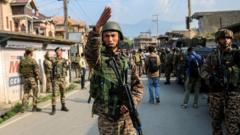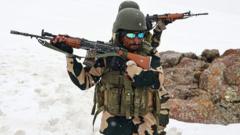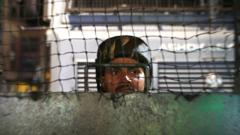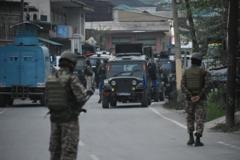Amid heightened tensions following a militant attack that killed 26 individuals, India has executed "Operation Sindoor," targeting Pakistan and Pakistan-administered Kashmir in a bid for accountability, igniting fierce responses from Islamabad.
**Escalation in Kashmir: India Launches Strikes Amidst Tensions with Pakistan**

**Escalation in Kashmir: India Launches Strikes Amidst Tensions with Pakistan**
India responds to a deadly attack with strikes against alleged militant sites in Pakistan-administered Kashmir, raising international concerns.
In an intense series of military actions, India has launched strikes on various locations within Pakistan and Pakistan-administered Kashmir, citing a commitment to respond to the deadly 22 April attack that left a grim toll of 25 Indians and one Nepali national. The Indian defense ministry has asserted that these operations, dubbed "Operation Sindoor," aim to hold accountable those behind the violence, claiming the strikes focused on "terrorist infrastructure" rather than military installations, thereby emphasizing their strategic intent to avoid escalation.
Pakistan has vehemently denied involvement in the militant attack, labeling India's actions as an unprovoked act of aggression. Prime Minister Shehbaz Sharif condemned the strikes, asserting they would not go unanswered. The Pakistani military claims to have intercepted Indian aircraft and drones, reporting casualties on both sides, including at least 26 dead and 46 injured in Pakistan-administered territories, while India cited civilian fatalities resulting from retaliatory shelling.
The catalyst for this operation was an attack in Pahalgam, which marked a resurgence in violence, stirring memories of historical flashpoints in the region. Survivors of the attack alleged that the militants targeted Hindu men specifically, igniting anger across India and prompting Prime Minister Narendra Modi's fierce commitment to pursuing the attackers relentlessly.
Despite India's strong accusations of Pakistani complicity in these militant activities, no specific groups or individuals have been formally named. Pakistani authorities maintain that they have no connection to the assault, further adding to the burgeoning mistrust between the nuclear-armed neighbors. The recent episode has drawn global attention, with calls for restraint from international leaders including UN chief Antonio Guterres and US President Donald Trump, reflecting an acute awareness of the risks of escalation in this fraught region.
The struggle over Kashmir remains a deeply entrenched issue for both India and Pakistan, with both nations claiming the territory but controlling only parts since their 1947 partition. This historical conflict has led to multiple wars, and the current cycle of violence is reigniting fears of larger-scale military engagement.
Pakistan has vehemently denied involvement in the militant attack, labeling India's actions as an unprovoked act of aggression. Prime Minister Shehbaz Sharif condemned the strikes, asserting they would not go unanswered. The Pakistani military claims to have intercepted Indian aircraft and drones, reporting casualties on both sides, including at least 26 dead and 46 injured in Pakistan-administered territories, while India cited civilian fatalities resulting from retaliatory shelling.
The catalyst for this operation was an attack in Pahalgam, which marked a resurgence in violence, stirring memories of historical flashpoints in the region. Survivors of the attack alleged that the militants targeted Hindu men specifically, igniting anger across India and prompting Prime Minister Narendra Modi's fierce commitment to pursuing the attackers relentlessly.
Despite India's strong accusations of Pakistani complicity in these militant activities, no specific groups or individuals have been formally named. Pakistani authorities maintain that they have no connection to the assault, further adding to the burgeoning mistrust between the nuclear-armed neighbors. The recent episode has drawn global attention, with calls for restraint from international leaders including UN chief Antonio Guterres and US President Donald Trump, reflecting an acute awareness of the risks of escalation in this fraught region.
The struggle over Kashmir remains a deeply entrenched issue for both India and Pakistan, with both nations claiming the territory but controlling only parts since their 1947 partition. This historical conflict has led to multiple wars, and the current cycle of violence is reigniting fears of larger-scale military engagement.





















